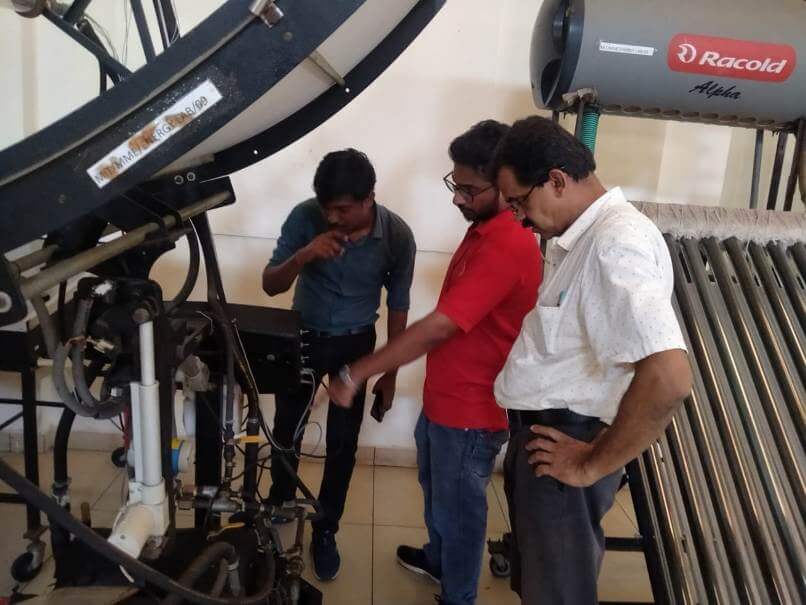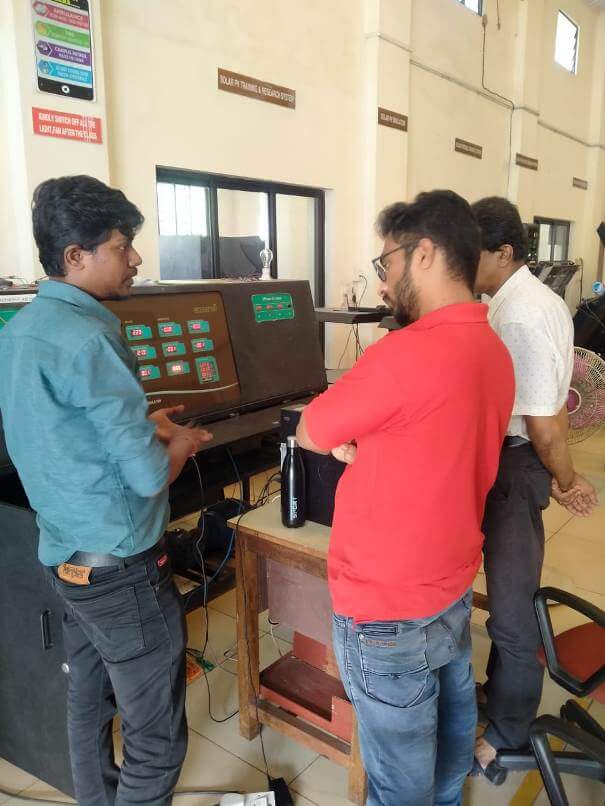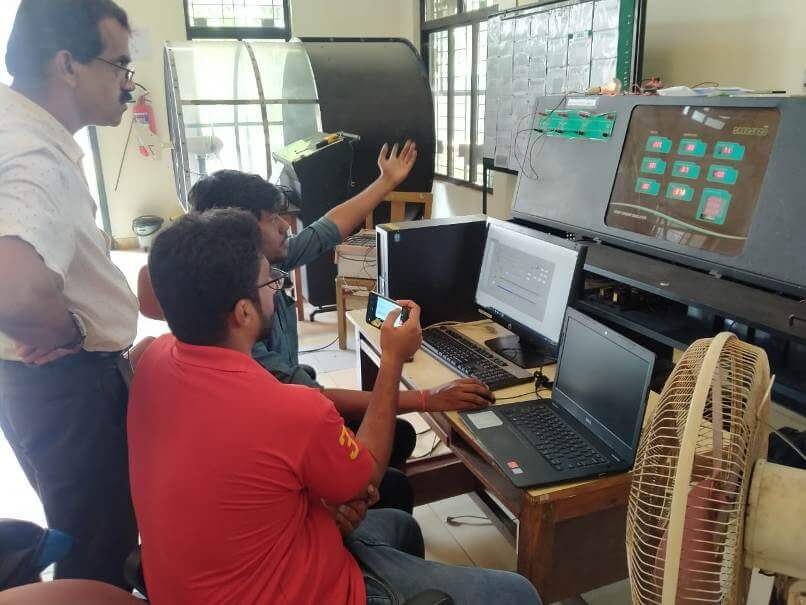Ecosense installed Renewable Energy Lab a few years ago at Department of Mechanical Engineering, Manipal Institute of Technology. The college authorities requested to refurbish all the equipments installed in Renewable Energy Lab so that they can function as good as new and the learning of students never stop.
The Renewable Energy Lab includes the following equipments:
1. Solar Thermal Training System
2. Thermal Energy Storage
3. Solar PV Training and Research System
4. Solar PV Grid Tied Training System
5. Solar Concentrator Training System and
6. Wind Turbine Emulator System
1. Solar Thermal Training System
The Solar Thermal Training System is a versatile model that replicates a real-time water heating system. It can be utilized for various purposes such as characterization and analysis of heat transfer. The system allows for demonstrations and calculations related to efficiency, overall heat loss coefficient, and heat removal factor. Additionally, it enables experimentation with different wind speeds, fluid temperatures, and flow speeds.
The system comprises three main components: the main collector system, the measuring unit, and the artificial light unit.
Main Collector System:
Flat Plate Collector: This component serves as the primary heat-absorbing unit. It is equipped with temperature, flow, and pressure sensors to measure the corresponding parameters of the fluid.
Measuring Unit:
Measurement Panel: The measuring unit consists of a panel that displays various parameters. This panel provides information necessary for analyzing the system's performance and efficiency.
Artificial Light Unit / Heat Generating Unit:
Halogen Lamp Panel: This component serves as an artificial light source, uniformly illuminating the flat plate collector within a laboratory environment. The artificial light unit allows users to conduct experiments without relying on natural sunlight.
The system's modular and scalable design enables easy transportation in and out of the lab. Users can conduct experiments using both artificial lights and actual sunlight, providing flexibility and versatility. The Solar Thermal Training System allows users to study and comprehend the operation and functionality of a flat plate collector water heating system, including its two modes of operation.
2. Thermal Energy Storage
The system is designed for conducting experiments on thermal energy storage using phase changing materials (PCMs). It consists of stainless-steel cylinders containing PCMs, with copper heat exchangers for charging and discharging the PCMs. The cylinders are insulated with polyurethane foam to prevent heat loss. A transparent container allows visualization of the phase changing process. Water is used as the heat transferring fluid, and three tanks supply the water for various purposes. The system can be connected to solar collectors for an alternative energy source. Components are connected with ½ inch G.I pipes, and gate valves control fluid flow. Sensors measure temperature, flow rate, etc., with a control unit displaying readings and enabling system control.

Ecosense refurbished Renewable Energy Lab at Manipal Institute of Technology
3. Solar PV Training and Research System
Ecosense’s Solar PV Training and research system enables user to learn about Solar PV standalone technology. Using this system, a user gains knowledge in three fields of Solar PV Standalone system:
a.) Physics of Solar PV Panels — I-V and P-V characteristics, series, and parallel connection of solar panels effect of irradiation, effect of temperature, effect of shadow, effect of tilting of panels, effect of geographical location etc.
b.) Components and Assembly of standalone system — use of blocking diode, use of bypass diode, use of solar charge controller, use of solar inverter, difference between MPPT and PWM charge controllers, AC load, DC load, battery charging/ discharging characteristics, assembly of several components and power flow calculations in each branch.
c.) Research in PV systems — Ecosense separately provides a research unit along with standalone experimental system. User can initiate research in the area of maximum power point tracking using this unit. It has provision of providing automatic as well as manual gate signals to charge controller. User can use his/ her own MPPT algorithm with any of the controller to provide manual gate signals.
4. Solar Grid Tied Training System
Ecosense’s Solar Grid Connected Training system enables user to learn about Solar Grid -tied technology. Using this system, a user gains knowledge of connecting an auxiliary grid (Solar PV) to the main grid, its essential components and transfer of power between the two grids. Using this system user gains knowledge in the following areas:
a.) Effect of different types of loads on Electrical Grid
b.) Effect of capacitance and inductance in Transmission lines
c.) Interfacing requirement of an auxiliary Grid to main grid
d.) Concept of anti-islanding

Ecosense refurbished Renewable Energy Lab at Manipal Institute of Technology
5. Solar Concentrator Training System
The Solar Concentrator Training System provides a comprehensive platform for studying and understanding solar thermal technologies. It allows users to perform experiments and research in the field of solar thermal energy. The system features parabolic reflectors, an absorber tube, a sun tracker, storage tanks, and a heat exchanger. It enables analysis of heat transfer, parabolic trough characteristics, and heat loss. The system is modular, scalable, and can be used with artificial light or actual sunlight. The modular and scalable design of the system allows for easy movement and experimentation, both indoors and outdoors, using artificial light or actual sunlight. It serves as an effective tool for education, research, and experimentation in the field of solar thermal energy.
6. Wind Turbine Emulator System
Wind turbine emulator mimics the behaviour of wind turbine for hardware level simulations. This system has a DC motor coupled with the Induction generator/ Permanent Magnet Synchronous Generator, speed of which is controlled as per the speed reference calculated by solving the mathematical model of wind turbine. An induction generator is coupled to the DC motor and bidirectional inverter is connected to the terminals of the generator. Researcher can execute the mathematical models of their newly developed or modified wind turbine and can simulate the speed/power of profile of turbine on hardware environment directly for different wind speeds & pitch angle.

Ecosense refurbished Renewable Energy Lab at Manipal Institute of Technology
Demonstration of Equipment Conducted
After Successful refurbishment of equipments, complete demonstration of equipment conducted. The demonstration and training session was joined by faculty members and students of the department.
